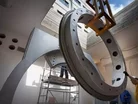The Christie NHS Foundation Joins Consortium to Develop Advanced Cancer Treatment

MRI-guided radiation therapy has been a topic of discussion within the healthcare industry for well over a decade. The possibility of enhancing real-time visualization of cancerous tissue during the delivery of radiation is a feat most doctors only dream of. That dream is seeing the light of reality, however, with the MR Linac Consortium.
Headed by Elekta and supported by Royal Philips, the consortium aims to develop the clinical value of an integrated magnetic resonance imaging (MRI) guided radiation therapy system. Integration of technology between Elekta and Philips could allow doctors to adapt radiation therapy during the procedure, ultimately increasing treatment accuracy and reducing side effects.
On July 22, it was announced that The Christie NHS Foundation Trust in Manchester, UK, joined the consortium. The specialist cancer center is the seventh member to join.
“The Christie was an essential participant in the project 14 years ago that laid the foundations of the use of cone beam computed tomography [CBCT] at the time of treatment to improve radiotherapy delivery,” said Niklas Savander, Elekta president and CEO. “It has a dedicated team of researchers in medical physics, radiotherapy and clinical oncology and MR imaging that is committed to the most accurate and individualized delivery of radiation therapy. The Christie has the perfect blend of experience and expertise to further help the consortium make MRI-guided radiation therapy a reality.”
Radiotherapy is one of the primary modalities used to treat cancer, either as a stand-alone or paired with other modalities such as chemotherapy. The consortium’s new technique is a significant milestone towards the development of a clinical system capable of capturing highly detailed MR images of tumors and surrounding normal tissue as a patient receives radiotherapy.
“We are very excited to be a part of an international consortium of truly exceptional centers that are striving as we are to develop technological innovations to benefit patients,” said Dr. Ananya Choudhury, Consultant and Honorary Senior Clinical Lecturer, Clinical Oncology at The Christie. “Unlike any imaging modality now in use in combination with radiotherapy, MRI can provide highly detailed images of the tumor and surrounding normal tissues. Moreover, MRI will permit physicians to non-invasively visualize and track the target during beam delivery – real-time imaging – which will further improve treatment accuracy.”
Launched in 2012, the MR Linac Consortium has already achieved great success in reaching its goal. Early in April, the University Medical Center Utrecht began installing the first generation MRI-guided radiation therapy system for non-clinical testing. Several of the sites are now undertaking treatment planning evaluation using the Monte Carlo based MRI-corrected algorithms in a research version of Elekta’s Monaco® treatment planning system.
Additionally, a number of consortium centers have active research programs linked to the system and have submitted abstracts to the American Association of Physicists in Medicine’s annual meeting, where specific sessions will be covering the latest advances in MRI-guided radiotherapy.
In addition to The Christie NHS Foundation Trust and the University Medical Center Utrecht, other consortium members include The University of Texas MD Anderson Cancer Center (Houston, Texas), The Netherlands Cancer Institute-Antoni van Leeuwenhoek Hospital (Amsterdam, the Netherlands), Sunnybrook Health Sciences Centre (Toronto, Ontario), The Froedtert & Medical College of Wisconsin Cancer Center (Milwaukee, Wisconsin) and The Institute of Cancer Research, working with its clinical partner The Royal Marsden NHS Foundation Trust (London, England).
“When we first started this journey with Elekta and the University Medical Center Utrecht more than a decade ago, we already had a clear vision, yet we could only dream of today’s MRI imaging performance,” said Gene Saragnese, CEO Imaging Systems at Philips Healthcare. “Since then we have come a long way and I am convinced that with the current state of the technology and the growing consortium of leaders in radiation therapy delivery, we have the prerequisites to make the integrated MRI-guided radiation therapy technology a game changer in cancer care.”
The MRI-guided radiation therapy system is a work in progress and not available for sale or distribution.



